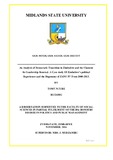Please use this identifier to cite or link to this item:
https://cris.library.msu.ac.zw//handle/11408/2428Full metadata record
| DC Field | Value | Language |
|---|---|---|
| dc.contributor.author | Ncube, Tomy | - |
| dc.date.accessioned | 2017-06-30T13:26:55Z | - |
| dc.date.available | 2017-06-30T13:26:55Z | - |
| dc.date.issued | 2016-11 | - |
| dc.identifier.uri | http://hdl.handle.net/11408/2428 | - |
| dc.description.abstract | Political systems and processes in Zimbabwe have attracted much commentary and attention in the world over, with much attention hinged and fixated on elections and the amassment of political hegemony by ZANU PF despite ruling in a dire state of a crippled and plummeting economy that should be inciting social and political dissent. Elections are associated with vote rigging, political violence and unscrupulous political activities that range from appointment of party loyalist in key, strategic and influential positions that define and determine politics of the day. The cry has been that such appointments have been in electoral and state institutions that have the mandate to necessitate democratic transition, the partisan appointments have led to a manifestation of the hiring of white collar electoral fraudsters who miraculously Nikuv elections to the favour of the mostly contested hegemonic political player ZANU PF. This study adopted a qualitative approach to its gathering of information regarding the hegemony of ZANU PF in Zimbabwe’s political experiences and processes, in its qualitative nature it attempted to gain an understanding of the underlying reasons and factors driving the political happenings and establish how people interpret the hegemony of ZANU PF, the interpretation of the Zimbabweans’ perception of the state of affairs was thereby established through the use of questionnaires and focus group discussions that showed a true reflection of the political realities on the ground with an aid of purposive sampling. Established was that the hegemony of ZANU PF is convolutedly tied to the lack of political resilience and charisma amongst opposition parties, incompetent political parties, partisan legal systems that favour the incumbent and general stateism. Strategically, with a great level of political astuteness, ZANU PF has seemingly been identified with using the containment-elimination approach in gobbling up its political opponents and adopting a political illusory approach to deceive its opposition by creating facades of democracy that hinder a transition of political power through elections. Notwithstanding is that Zimbabwe needs thoroughly nurturing of political leadership in schools, political parties and if necessary establish political academies to help inculcate a spirit of political leadership in order for political competition to be feasibly witnessed in Zimbabwe’s democratic transition story. | en_US |
| dc.language.iso | en | en_US |
| dc.subject | Democratic transition | en_US |
| dc.title | An Analysis of Democratic Transition in Zimbabwe and the Clamour for Leadership Renewal. A Case study Of Zimbabwe’s political Experiences and the Hegemony of ZANU PF From 2000-2013 | en_US |
| item.fulltext | With Fulltext | - |
| item.grantfulltext | open | - |
| item.languageiso639-1 | en | - |
| Appears in Collections: | Bachelor Of Science In Politics And Public Management Honours Degree | |
Files in This Item:
| File | Description | Size | Format | |
|---|---|---|---|---|
| NCUBE,T.pdf | Full Text | 2.36 MB | Adobe PDF |  View/Open |
Page view(s)
22
checked on Jul 27, 2024
Download(s)
32
checked on Jul 27, 2024
Google ScholarTM
Check
Items in MSUIR are protected by copyright, with all rights reserved, unless otherwise indicated.



